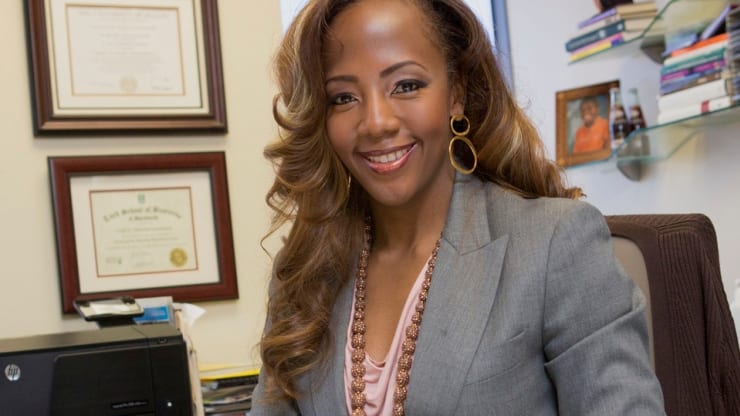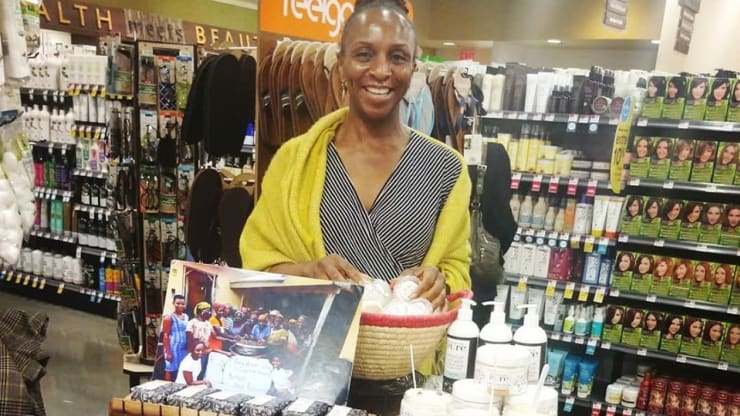- Black women are starting businesses at the fastest clip of any racial group, according to research by American Express.
- Since 2007, the number of firms owned by African-American women has grown by 164%.
- Despite the hustle, minority women are being shut out when it comes to access to capital.

“They said they would do it under review if I would consider taking out a loan with my husband a co-signer,” she recalled. She went to a few more banks and was also turned down.
Fortunately, she had once met the founder of the Texas Women’s Venture Fund and decided to get in touch again. The timing was fortuitous. The fund, which invests in women entrepreneurs who have garnered at least $2 million in revenue, is led or majority-owned by a woman, and she was looking for other prospects. They selected Warrior’s project and gave her $4 million to fund it.
“I can’t tell you how many times I’ve heard, ‘Don’t take it personal,’” said Warrior. “How am I not supposed to take it personally if I know that if a guy goes in with the same deck, he will have a greater chance at securing the deal?” she said, noting she built Warrior into a multimillion-dollar company with 50 employees.
Growing but denied credit
Warrior is far from alone. While entrepreneurship in the U.S. as a whole has been on the decline, black women are starting businesses at the fastest clip of any racial group, according to research by American Express. Since 2007, the number of firms owned by African-American women has grown by 164%. Nearly half of women-owned businesses in the United States, or 44%, are controlled by minority women, according to Census data and projections by research firm Womenable. That’s up from 20% in 1997.
Yet despite the hustle, minority women are being shut out when it comes to access to capital. According to the Federal Reserve System’s 2016 Small Business Credit Survey, black women are more likely than their non-minority peers to identify access to credit as a challenge. They also reported being less likely to receive some or all of the financing they requested. Indeed, the Small Business Administration Office of Advocacy has found that women and minority business owners are denied loans and pay higher interest rates than white counterparts, even after controlling for factors such as credit score.
In venture capital, men still get the lion’s share of funding, with only 2% of capital going to U.S.-based female-only founder teams, according to PitchBook. Of the 2%, women of color get only a fraction.
There are increasing efforts to correct this wrong through various means. An uptick in female-focused funds, including some for black women, is one encouraging sign. There is also growth in resources to support black women entrepreneurs, such as Black Women Talk Tech, Black Girl Ventures, $100 million New Voices Fund, Twenty65 and $26 million Backstage Capital Fund.
“Most cities have some co-working space but don’t have a low-barrier way to access capital. They may not have black and brown leaders working locally to move the needle on things. So showing up and being in the room is a huge part of the work,” said Shelly Bell, founder of Black Girl Ventures, an organization that provides education and advisory services that outline a road map for the growth and success of minority and/or veteran women entrepreneurs. Part of the difficulty that black women face in accessing capital is breaking into the insular networks of banking and venture capital.
“There are banks that are discriminatory,” acknowledges Bell, but a big part of the challenge is that many black women are applying for loans without building relationships. Minority women start with a disadvantage in this respect. “Everything is about who you know. If your mom didn’t go to school, or dad didn’t play golf with a founder, or your mom didn’t go to school with someone on the board of a large educational institution, where do you find those connections? One of the things we hope to do is bring those people into one space,” she said.
Creating new networks
To be sure, bringing people together is easier said than done.
“VC is done through small networks and gatekeepers,” said Dell Gines, senior community development advisor at the Federal Reserve Bank of Kansas City, who has written a report on black women start-ups as well as guides and an ebook on entrepreneurship and economic development. Those without access to those networks or gatekeepers are far less likely to get their pitch heard, much less get the money.
The world of venture capital and banking is insular and predominately white and male. Because it’s human nature to gravitate to what is familiar, that means when it comes to investing, businesses that are geared for women or minority communities are often not valued.
When Funlayo Alabi started Shea Radiance, a natural skin and hair care brand 10 years ago, she saw a gap in the U.S. market for natural, unrefined shea butter products. An immigrant from Africa, she saw first hand how the well unrefined shea butter that her mother brought form home worked on her son’s eczema. She started selling small batches of the natural moisturizer, mixed with essential oils, at the local farmers market and saw great demand.
Soon she started tapping her own retirement savings to start the business and import her product, and raised more than $50,000 from friends and family to bring in a 20 foot shipping container of unrefined shea butter, sourced from eight village cooperatives in Nigeria. As her business grew, she knew she needed to raise more capital.

Shea Radiance was already carried in some Whole Foods stores as well as natural stores. She approached several local banks, bringing along sales projections and products, but none of the bankers, all of whom were white and male, seemed to understand the appeal of natural skincare products.
“Bankers didn’t understand naturals and didn’t fully understand how our sourcing worked. They thought there was a lot of risk there. I was not able to secure loans from traditional sources,” she said.
The statistics line up with Alabi’s experience. According to research by the Federal Reserve Bank of Kansas City, black women business owners are much more likely to report that they received none of the financing they requested.
Part of the reason for these loan denials is a mismatch between what bankers or venture capital investors see as a void in the market and the opportunities minority business owners are seeing, said Gines. Entrepreneurs often create businesses based on a need they see in the market in their communities.
“We are missing the boat by not supporting already motivated entrepreneurs,” said Gines. “Black and Latina women are producing tons of firms and showing motivation — probably a whole lot more than would be willing and able to start high-growth firms with direct economic value” — but aren’t getting funding, he said.
To overcome this obstacle of mismatched perceptions, organizations like Black Girl Ventures are working on bringing the two communities — investors and minority women entrepreneurs — together in constructive ways.
“Investors sometimes say they can’t find a black or brown business owner or black or brown women. I want to raise my hand to say I am here to facilitate conversation. I have an entire pool of women-owned businesses. I would like for the day of ‘I couldn’t find anyone’ to go away,” she said.
Article Credit: cnbc
